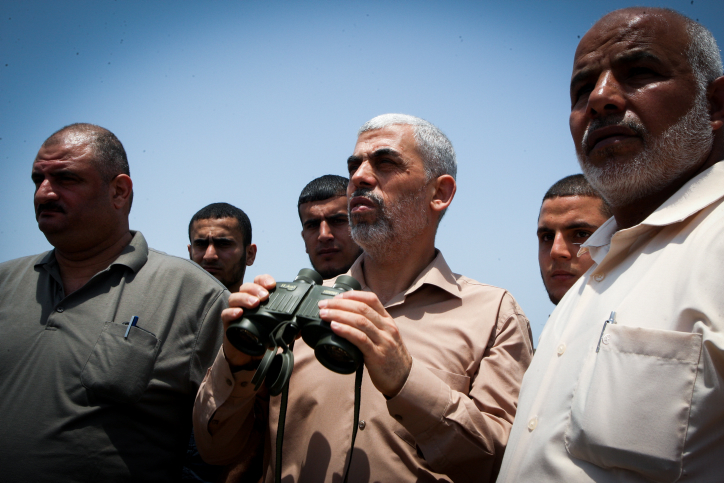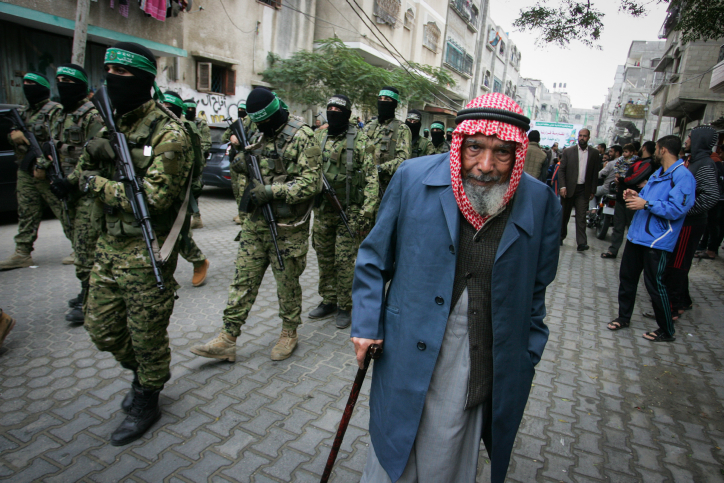While Egypt and the UN have their own plans to solve the crisis in Gaza, both have one thing common: strengthening Hamas at the expense of the Palestinian Authority. In order to maintain its hold on the West Bank, Israel will prefer the option that will give Hamas autonomy.

As the latest round of violence between Israel and Hamas ends with a ceasefire, the sides will resume their multilateral talks on a long-term arrangement exactly where they stopped. Two different yet interrelated agreements are on the table, one proposed by Egypt and the other by Nickolay Mladenov, the UN special envoy to the peace process.
Both Egypt and Mladenov are doing their best juggling act, and they have been lucky thus far. Egypt wants an Israeli-sanctioned agreement between Fatah and Hamas, while Mladenov suggests an arrangement between Hamas, Israel, and Egypt. Although both initiatives are interdependent, the two sides are communicating with one another only through the mediators.
According to documents leaked to the Arab press, Egypt has proposed a piecemeal agreement between Hamas and Fatah. Minor questions will be resolved first; including the return of the Ramallah government to the Gaza Strip, while Hamas will join the PLO only in the final phase. The interesting part of Egypt’s proposal is its support for Hamas’ positions. Egypt and Hamas reject PA President Mahmoud Abbas’ precondition for reconciliation, according to which his government will oversee the the Izz ad-Din al-Qassam Brigades, Hamas’ armed wing.
Egypt and Hamas want to establish a joint committee that will discusses the issue of security in the Gaza Strip. In order to make reconciliation easier, Hamas will be obligated not to use its armed wing unilaterally, while the Ramallah government will not decide on peace with Israel unilaterally. Decisions on war and peace, say Hamas spokespeople, demand a national consensus. Moreover, Egypt supports Hamas’ demand for joint control over Gaza with the Ramallah government. Until now, Abbas has demanded sole PA control; now he is in a bind, since Hamas has an alternative.
That alternative can be found in Mladenov’s proposal for an agreement with Israel. The first phase will include an end to confrontations along the border with Israel and the opening of crossings, bringing an end to the siege that Israel and Egypt placed on Hamas in 2007, which they hoped would bring down its regime. In the second phase, Israel will allow more electricity into the Strip, and the last phase will include the building of a seaport, an airport, and a power station in Egyptian territory that will serve Gaza. Funding for these projects, as well as for infrastructure development inside Gaza, will come from the United Arab Emirates.
The Hamas government will be internationally recognized, which will also serve to strengthen its power internally. Hamas will prove to the public that standing strong brings the goods. Israel, which in the past rejected plans to establish and supervise a seaport, will be resigned to place its trust in Egypt. It is doubtful whether the Israeli establishment trusts Egyptian supervision, and it is highly likely that the establishment will continue to suspect Hamas of smuggling weapons and constructing tunnels for military use. In exchange, however, Israel will not face incendiary kites, which have become a political problem for the Israeli government. It will also greatly postpone the probability of a military confrontation with Hamas, which Israel knows it cannot win. Furthermore, the proposed arrangement is consistent with what the Israeli Right sees as its historical mission and achievement: endless Israeli rule over the West Bank.

Turning the Hamas-ruled Strip into an autonomous zone with greater authority than even the PA serves the interests of Israel’s right-wing government. Netanyahu and the White House are trying to coerce Abbas into accepting the “deal of the century,” which amounts to a state-minus in Areas A and B of the West Bank, alongside a state-minus in Gaza. If the Egyptian plan for reconciliation between Hamas and Fatah fails, it will be a boon for the Netanyahu-Trump plan, since Mladenov’s arrangement will lead to the creation of a separate government in the Gaza Strip.
On the other hand, a compromise between Hamas and Fatah and the establishment of political and administrative ties between Gaza and the West Bank will significantly help thwart the Trump-Netanyahu plan. This will mean Abbas will have to share control over Gaza with Hamas, despite the fact that for years he has fought the group and distrusts it entirely. Abbas believes that the Hamas leadership is searching for every way to take over the West Bank, and he is uninterested in lending it a hand. Beyond that, he insists on maintaining security coordination with Israel, despite the public criticism, in order to block Hamas in the West Bank.

It is unclear at this point whether Abbas’ position vis-à-vis his Islamic rivals is flexible, and whether he views the “deal of the century” as a bigger threat than getting a foothold in the Hamas regime. Abbas must also decide whether Israel’s decision to abandon its alliance with the PA against Hamas, and its decision to fortify the group’s rule in Gaza, will force a change in the his approach toward the Jewish state and security coordination.
Netanyahu also has a problem. Hamas demands that in return for both the bodies of Israeli soldiers as well as civilians, Israel will release the prisoners from the Gilad Shalit swap who were re-arrested contrary to the agreement. Hamas also rejects Israel’s position according to which the prisoner swap will take place in the first phase, and instead has proposed delaying it for two months. On the one hand, Netanyahu is dealing with public pressure from the soldiers’ families, and on the other hand, with those in the defense establishment who support postponing the prisoner exchange.
Menachem Klein is a professor of political science at Bar Ilan University. He was an advisor to the Israeli negotiating team during the 2000 peace talks, and is one of he leading members of the Geneva Initiative. His book, Lives in Common: Arabs and Jews in Jerusalem, Jaffa and Hebron, was selected by The New Republic as one of 2014’s ‘best books for understanding our complicated world.’ This article was first published in Hebrew on Local Call. Read it here.
